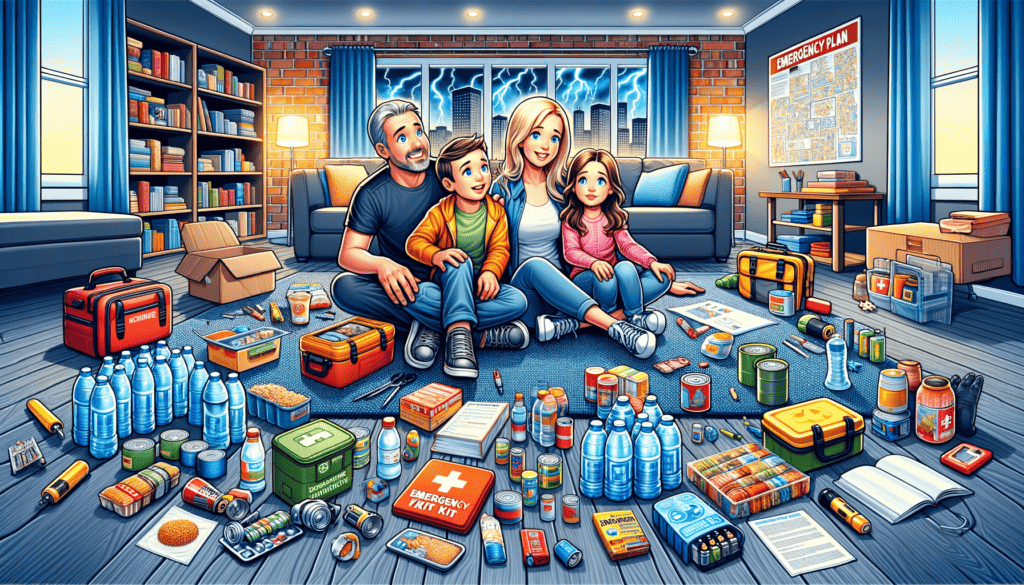
The Importance of Being Prepared
Understanding the Need for Preparedness
Having an emergency kit in your home is crucial for ensuring safety and preparedness in unexpected situations. Natural disasters, power outages, and other emergencies can occur without warning, making it essential to have a plan and the necessary supplies.
The Consequences of Unpreparedness
Failing to have an emergency kit can result in severe consequences during a crisis. Lack of access to essential items like water, food, and medical supplies can escalate an already difficult situation, potentially leading to health risks and increased stress.
Learning from Past Emergencies
History has shown that emergencies can strike at any time, often with devastating effects. By analyzing past events, we can understand the importance of being prepared and the role an emergency kit plays in ensuring safety and resilience.
Key Components of an Emergency Kit
Essential Items to Include
A well-stocked emergency kit should include items like water, non-perishable food, a first-aid kit, flashlights, batteries, and important documents. These items are critical for survival and safety during an emergency.
Tailoring the Kit to Your Needs
It’s important to customize your emergency kit based on your family’s specific needs. This may include medications, baby supplies, pet items, or any special tools or equipment required for your household.
Regular Maintenance and Updating
An emergency kit should be regularly checked and updated to ensure all items are functional and within their expiration date. This regular maintenance guarantees that your kit is ready to use when needed.
The Psychological Impact of Preparedness
Reducing Anxiety and Stress
Knowing you have an emergency kit can significantly reduce anxiety and stress during uncertain times. Preparedness provides a sense of control and calmness, knowing you are ready to handle various situations.
Building Confidence in Emergency Situations
Being prepared with an emergency kit can boost confidence in your ability to handle emergencies. This confidence can be crucial in making effective decisions during high-stress situations.
Encouraging a Culture of Preparedness
Having an emergency kit not only benefits your household but also encourages a culture of preparedness in your community. This collective preparedness can enhance the overall resilience of your neighborhood.
The Risks of Unpreparedness
Immediate Dangers in Emergencies
Without an emergency kit, you may face immediate dangers in a crisis, such as lack of access to clean water, food, or necessary medical supplies. This can increase the risk of health complications and other serious issues.
Long-Term Implications
The long-term implications of being unprepared can include increased financial burdens, prolonged recovery time from an emergency, and potential emotional trauma. These factors highlight the importance of having an emergency kit.
The Broader Impact on the Community
Unprepared individuals can also impact the broader community during emergencies, as they may require additional resources and assistance, potentially straining local emergency services and support systems.
Educating Yourself and Your Family
Learning About Emergency Preparedness
Educating yourself and your family about emergency preparedness is key. This includes understanding the types of emergencies that could occur in your area and the best responses to these situations.
Practicing Emergency Drills
Regularly practicing emergency drills can ensure everyone in your household knows how to use the emergency kit and understands the emergency plan. This practice can be lifesaving in a real emergency.
Staying Informed
Keeping informed about potential emergencies and staying updated on local news and weather forecasts is crucial. This information can guide you in making timely decisions and adjustments to your emergency plan.
Financial Considerations
Budgeting for an Emergency Kit
Creating an emergency kit can be done on a budget. Prioritize essential items and consider gradually building your kit to spread out the cost.
The Cost of Unpreparedness
The cost of not having an emergency kit can far exceed the initial investment in preparing one. In emergencies, the financial burden of unpreparedness can be significant, often involving unexpected expenses and losses.
Insurance and Emergency Savings
Along with an emergency kit, having insurance and emergency savings can provide additional financial security during crises. These measures can help cover unexpected costs and reduce financial stress.
Community Resources and Support
Leveraging Local Resources
Many communities offer resources and support for emergency preparedness. This can include workshops, free or discounted supplies, and guidance on creating effective emergency plans.
Building a Support Network
Creating a support network with neighbors and local community members can enhance your preparedness. This network can provide assistance, share resources, and offer support during emergencies.
Volunteering and Community Involvement
Getting involved in community emergency response teams or volunteering for local disaster relief efforts can provide valuable experience and knowledge, further enhancing your preparedness skills.
Things to Consider
Re-evaluating Your Kit Annually
It’s important to re-evaluate your emergency kit annually to ensure it meets your current needs and includes up-to-date supplies.
The Importance of Communication
Establish a communication plan with your family and loved ones. During an emergency, having a clear communication strategy is crucial for staying connected and informed.
Embracing a Proactive Mindset
Adopting a proactive mindset towards emergency preparedness can make a significant difference in your response to a crisis. Being proactive means continuously improving your preparedness plans and staying informed.
Conclusion
Not having an emergency kit in your home is a significant oversight that can have serious consequences during a crisis. By understanding the risks of unpreparedness, building a comprehensive emergency kit, and adopting a proactive approach to preparedness, you can ensure the safety and well-being of yourself and your loved ones in any emergency situation.






Leave a Reply